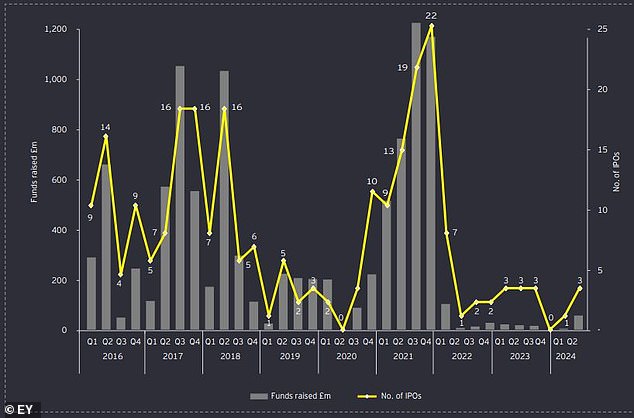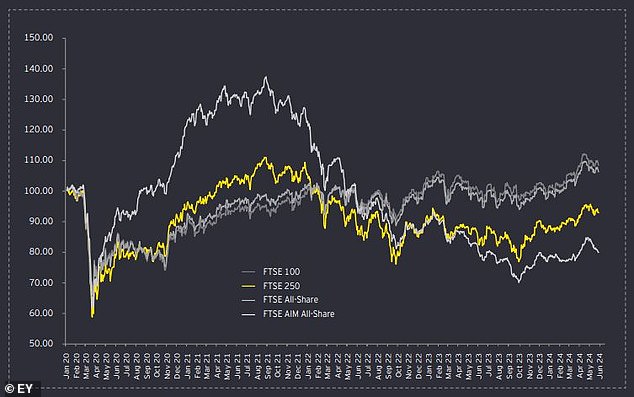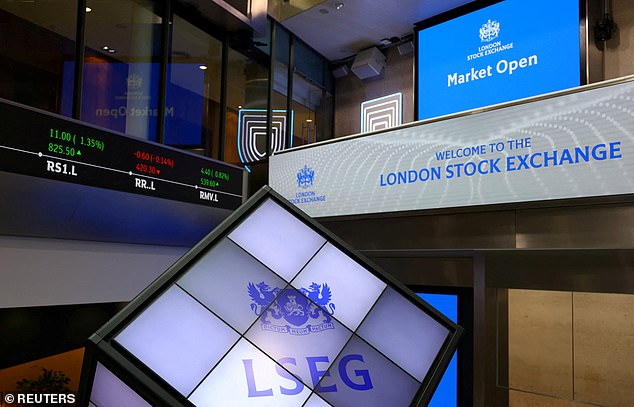Table of Contents
The future of London’s AIM market is “delicately balanced” and “many” companies are considering delisting, the chief executive of energy supplier Yu Group has warned.
Bobby Kalar told shareholders on Tuesday he was disappointed by the lack of commitment from large institutional investors and frustrated by the “lack of recognition” of the company’s financial performance.
This follows a sustained period of weak AIM returns, a rise in exchange delistings and a fall in new entrants, damaging the market’s credibility as an efficient enabler of growth for small businesses.
Kalar said: “Many AIM companies are questioning the future of the market and the wisdom of continuing to list.”
Exodus: CEOs have voted with their feet and are leaving LSEG’s AIM market
London’s appeal as a listing destination has come under pressure in recent years, with critics citing evidence of undervaluation, poor performance and weak liquidity as concerns.
The impact has been that London has been ignored by big companies looking to go public, companies that have been taken over by private equity and groups that have shifted their listings to rival exchanges or stopped trading altogether.
Industry and government have collaborated in efforts to increase the attractiveness of London’s capital markets, although reform has generally focused on the FTSE 100 and FTSE 250 indices.
The London Stock Exchange Group says AIM is “the world’s most successful and established marketplace for dynamic, high-growth companies,” which benefit from access to “a diverse set of investors and a supportive advisory community that understands the needs of entrepreneurial businesses.”
But a lack of liquidity in the market has contributed to lacklustre share price growth for many AIM-listed companies, as well as wild price swings in response to company updates.
The FTSE AIM 100, which encompasses the top 100 companies in the AIM market, is up just 3% over the past year and is around 30% below its pre-Covid level. A similar pattern is seen in the AIM All-Share index.
New initial public listings on the AIM have yet to recover to their pre-Covid levels after an initial post-lockdown spike in 2021.
EY data shows that four companies listed on the AIM in early 2024, after nine companies listed last year. In contrast, 16 new companies entered the market in a single quarter three times between 2017 and 2018.
Separate data from accounting group UHY Hacker Young shows that fewer IPOs and more delistings have driven the number of companies in the index to its lowest level in more than 20 years.

Fall: IPOs and cash raised on AIM have fallen dramatically in recent years
Yu Group’s Kalar said the decline reflects companies’ dissatisfaction with the market.
The group, which is a specialist provider of energy and utility solutions to UK businesses, saw its revenues rise 60 per cent year-on-year to £312.7m in the first six months of 2024.
Adjusted profits before incidents rose 49 per cent to £20.4m, driven by demand for its smart metering solutions.
It is one of the fastest growing providers in the B2B space, with market share increasing to 1.8 percent from 1.4 percent at the beginning of the year.
Kalar said: ‘The lack of institutional commitment has been disappointing, even though management has delivered tremendous value year after year.
‘Many AIM companies are questioning the future of the market and the wisdom of continuing to list. This has been reflected in the reduction in the number of listed companies.

Bobby Kalar owns 51.6% of Yu Group shares
‘The future of the AIM market is delicately balanced and will not be improved if the current government further punishes and disincentivises high-growth entrepreneurial companies.’
Kalar holds a major stake in Yu Group
Yu Group Shares The company’s shares have risen 1,667 percent over the past five years to 1,590.5 pence. The stock has risen more than 30 percent since the start of the year, but management believes the company remains undervalued.
CEO Kalar is also by far the company’s largest shareholder, with a 51.6 percent stake according to the company’s website.
Yu Group’s second and third largest shareholders, Jamieson Principal Pension Fund and Premier Miton, hold 6.6 and 6.3 percent respectively.
Analysts at SP Angel maintain a buy rating on Yu Group shares with a target price of 2,100p, about 32 per cent above their current level.
The analysts wrote in July: ‘We continue to see scope for Yu Group to grow its revenue base to over £1.4bn within a couple of years.
‘With the stock trading at a FY24E P/E of

Bringing up the rear: AIM market performance has lagged behind major UK indices
DIY INVESTMENT PLATFORMS

AJ Bell

AJ Bell
Easy investment and ready-to-use portfolios

Hargreaves Lansdown

Hargreaves Lansdown
Free investment ideas and fund trading

interactive investor

interactive investor
Flat rate investing from £4.99 per month

Saxo

Saxo
Get £200 back in trading commissions

Trade 212

Trade 212
Free treatment and no commissions per account
Affiliate links: If you purchase a product This is Money may earn a commission. These offers are chosen by our editorial team as we believe they are worth highlighting. This does not affect our editorial independence.

